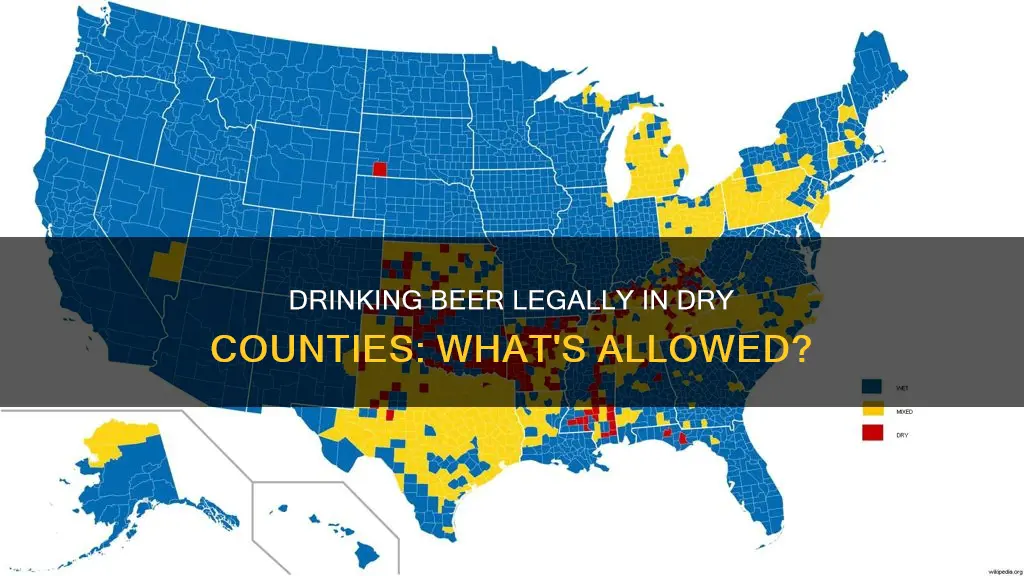
In the United States, a dry county is one where the government forbids the sale of any alcoholic beverages. While the 21st Amendment repealed prohibition, and local governments do not have the power to ban alcohol altogether, some dry counties remain, mostly in the Southern United States. In these counties, you cannot buy alcohol, but you can drink it in the comfort of your own home. The persistence of dry counties is significant and not entirely rational, and is influenced by a variety of factors including history, religion, and corporate interest.
| Characteristics | Values |
|---|---|
| Definition | A dry county prohibits the sale of alcohol |
| Extent of Prohibition | Some prohibit off-premises sale, some prohibit on-premises sale, and some prohibit both |
| Number of Dry Counties | More than 500 dry counties and 83 dry municipalities in Alaska; 34 in Arkansas; 3 in Florida; 11 in Kentucky; 3 in Tennessee; 4 in Texas; 9 in Virginia |
| Location | Mostly in the Southern United States |
| Reasons | Religious, historical, cultural, and corporate interests; in rural Alaska, it is due to problems with alcohol use disorder and alcohol-related crime |
| Exceptions | Consumption of alcohol is not banned in most dry counties; restaurants in dry counties can serve alcohol with a permit; drinking in a dry county is not illegal |
What You'll Learn

Dry counties are mostly in the Southern United States
In the United States, a dry county is a county whose government forbids the sale of any kind of alcoholic beverage. Some prohibit off-premises sales, some prohibit on-premises sales, and some prohibit both. While the vast majority of counties now permit the sale of alcohol in at least some circumstances, some dry counties remain, mostly in the Southern United States.
The largest number of dry counties is in Arkansas, where 34 out of 75 counties are dry. In 1906, 54 of Arkansas's 75 counties were completely dry, influenced by the anti-liquor campaigns of the Baptists and Methodists. Other states with a notable number of dry counties include Mississippi, where 36 of the 82 counties were dry or "moist" (meaning some sales of alcohol are permitted) before the state repealed its alcoholic prohibition in 2021, and Tennessee, which is dry by default. In fact, Moore County, Tennessee, is the home county of Jack Daniel's, a major American producer of whiskey, and the product is not available in stores or restaurants within the county.
In addition to these states, a 2004 survey by the National Alcohol Beverage Control Association found that there are dry counties in Alaska, Florida, and Georgia. Furthermore, there are dry municipalities in several other states, including Alabama, California, Colorado, Connecticut, Delaware, Idaho, Kansas, Kentucky, Louisiana, Maine, Massachusetts, Michigan, Minnesota, New Hampshire, New Jersey, New Mexico, New York, North Carolina, Ohio, Rhode Island, South Dakota, Texas, Vermont, Virginia, Washington, West Virginia, and Wisconsin.
The reason for maintaining prohibition at the local level is often religious in nature, as many evangelical Protestant Christian denominations discourage the consumption of alcohol by their followers. A 2018 study of wet and dry counties in the U.S. found that "Even controlling for current religious affiliations, religious composition following the end of national Prohibition strongly predicts current alcohol restrictions."
Viagra and Beer: A Safe Mix?
You may want to see also

Dry counties prohibit the sale of alcohol, not consumption
Dry counties are areas where the sale of alcohol is prohibited by the local government. This means that alcohol cannot be sold in stores, bars, or restaurants within these counties. However, it is important to note that dry counties do not prohibit the consumption of alcohol. While residents of dry counties cannot purchase alcohol within their county, they can still legally drink in the comfort of their homes.
The existence of dry counties may seem surprising, given that prohibition was repealed in the United States in 1933. However, since then, the legislation regarding alcohol sales has been left to the discretion of each state. While some states, like Arizona, Hawaii, and Illinois, do not allow local jurisdictions to implement stricter alcohol laws than those at the state level, thus preventing the existence of dry counties, other states grant their localities the power to decide whether to allow alcohol sales.
As of 2019, there were still around 500 dry counties across the United States, with the majority located in the Southern states. Arkansas, in particular, stands out for having the highest number of dry counties, with 34 out of its 75 counties being dry. Other states with a notable number of dry counties include Mississippi, Florida, and Texas.
The persistence of dry counties can be attributed to various factors, including religion, history, corporate interests, and abstinence culture. For example, in Oglala Lakota County, South Dakota, which falls within the Pine Ridge Indian Reservation, the dry county status is influenced by the complicated relationship between Native Americans and alcohol. Similarly, in Utah, the prevailing Mormon faith forbids the consumption of alcohol.
While dry counties prohibit the sale of alcohol, they do not necessarily make their communities safer or reduce alcohol-related problems. Some studies have found that alcohol-related automobile crashes and DUI-related incidents are higher in dry counties compared to wet counties. Additionally, dry counties may face economic challenges due to the loss of tax revenue, as drinkers are willing to cross county or state lines to purchase alcohol.
Beer and Fishing: A Match Made in Heaven?
You may want to see also

Drinking in a dry county is legal, but buying alcohol is not
Well, in the United States, a dry county is a county whose government forbids the sale of any kind of alcoholic beverages. This can include both off-premises and on-premises sales, or sometimes just one of these. It's important to note that this only applies to the sale of alcohol, not the consumption. So, while you can't buy a drink in a dry county, you can still drink it. This is because, while the 21st Amendment repealed nationwide Prohibition, it left alcohol prohibition legislation to the discretion of each state. However, this authority is not absolute, and state laws cannot impede interstate commerce between states that permit alcohol sales.
The majority of dry counties are in the Southern United States, with Arkansas having the highest number at 34 out of its 75 counties. Other states with dry counties include Alaska, Florida, Mississippi, and Tennessee. The persistence of dry counties is often attributed to a mix of factors, including history, religion, corporate interest, and abstinence culture. For example, Oglala Lakota County in South Dakota, which is the state's only dry area, falls entirely within the Pine Ridge Indian Reservation, and Native Americans have had a complicated relationship with alcohol. Religion also plays a role, as in Utah, where Mormonism is the prevailing faith and religion forbids alcohol consumption.
The existence of dry counties has led to some interesting phenomena, such as bootlegging and the beer mail movement, where people trade beers online to get around retail chains. It has also raised questions about public safety, with some studies indicating that alcohol-related automobile crashes are higher in drier parts of the country. Additionally, dry counties may face a loss of tax revenue as drinkers are willing to drive across county or state lines to purchase alcohol.
Birth Control and Beer: Is It Safe to Drink?
You may want to see also

Dry counties can be contrasted with wet and moist counties
In the United States, there are over 200 dry counties, mostly in the Southern states. The largest number of dry counties is in Arkansas, with 34 out of 75 counties being dry. In 1906, 54 of Arkansas's 75 counties were completely dry, influenced by the anti-liquor campaigns of the Baptists and Methodists. Other states with dry counties include Alabama, Alaska, Florida, Georgia, Kansas, Kentucky, Mississippi, New Mexico, Ohio, Tennessee, and Texas.
The history of dry counties dates back to the prohibition era, and since its repeal in the 1930s, each town or municipality has had the right to choose whether to allow alcohol to be consumed or sold within its borders. The decision to sell or not to sell alcohol is often based on religious ideology in certain parts of the country.
While dry counties may have lower rates of alcohol-related crimes and arrests, they may face issues such as increased drug use and a loss of tax revenue as drinkers travel to neighbouring wet counties to purchase alcohol.
Underground Beer Coolers: Do They Keep Drinks Chilled?
You may want to see also

Dry counties are often religious in nature
In 1906, just over half of U.S. counties were dry. This was influenced by the anti-liquor campaigns of the Baptists (both Southern and Missionary) and Methodists. A 2018 study of wet and dry counties in the U.S. found that religious composition following the end of national Prohibition strongly predicts current alcohol restrictions.
Today, the largest number of dry counties is in Arkansas, with 34 out of 75 counties being dry. In 1906, 54 of Arkansas's 75 counties were completely dry. Other states with a notable number of dry counties include Mississippi, which had 36 dry or moist counties out of 82 total counties as of 2021, and Florida, which has three dry counties out of 67.
While the number of dry counties has decreased over time, there are still dry communities throughout the United States, mostly in the Southern United States. The exact number is hard to pinpoint, but some accounts estimate there are over 80 dry counties left across nine different states.
Drinking Beer on Rhode Island's Beaches: What's Allowed?
You may want to see also
Frequently asked questions
Yes, you can drink beer in a dry county, but you can't buy it there. The 21st Amendment repealed prohibition, and local governments do not have the power to ban alcohol altogether.
A dry county is a county in the United States where the sale of alcoholic beverages is forbidden by the local municipality.
Examples of dry counties include Moore County, Tennessee, which is home to the Jack Daniel's distillery, and Oglala Lakota County, South Dakota, which falls entirely within the Pine Ridge Indian Reservation.







